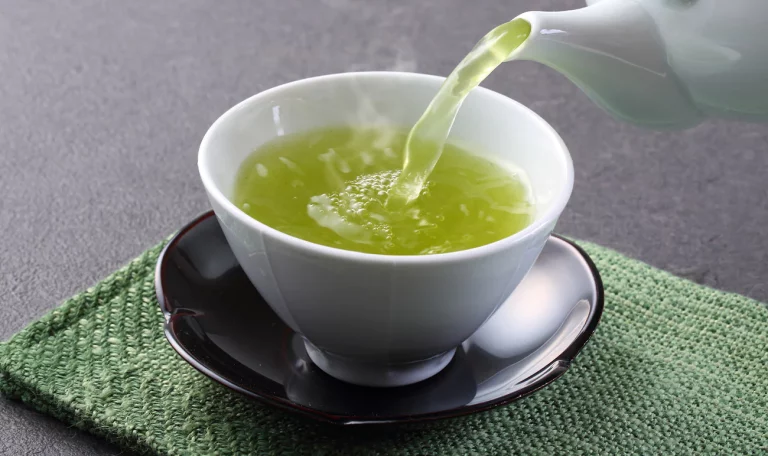Green tea is a popular beverage known for its numerous health benefits and refreshing taste. However, if you’ve ever brewed green tea and found it to be bitter, you may be wondering what causes this unpleasant taste. In this article, we’ll explore the factors that contribute to the bitterness in green tea and provide tips on how to make your cup of green tea more enjoyable.
Green tea is derived from the Camellia sinensis plant and has been consumed for centuries due to its antioxidant properties and potential health benefits. It is packed with polyphenols, catechins, and flavonoids, which are believed to have a positive impact on overall well-being. However, the taste of green tea can vary depending oooo on various factors.
Understanding the Flavor Profile of Green Tea
The word Green tea is very soothing to ears. Before we delve into the reasons behind the bitterness in green tea, it’s essential to understand its flavor profile. Green tea offers a delicate and nuanced taste characterized by sweetness, umami, and sometimes a hint of bitterness. The bitterness is usually subtle and desirable when balanced with other flavors. However, when green tea becomes excessively bitter, it can be off-putting to some individuals.
Factors Influencing Bitterness in Green Tea
Several factors contribute to the bitterness in green tea. Let’s explore each of them in detail:
a. Tea Leaves Quality
The quality of tea leaves plays a crucial role in the taste of green tea. Low-quality leaves or leaves that have been improperly processed can result in a bitter brew. Opting for high-quality green tea from reputable sources, such as itseverythingtea.com, ensures you’re getting tea leaves that have been carefully selected and processed.
b. Steeping Time and Temperature
The steeping time and temperature greatly affect the flavor profile of green tea. Steeping green tea for too long or using water that is too hot can extract more tannins, resulting in bitterness. It is recommended to steep green tea for about two to three minutes at a temperature between 160°F and 180°F (70°C to 82°C) to avoid excessive bitterness.
c. Water Quality
The quality of the water used to brew green tea can impact its taste. Using water with a high mineral content or impurities may contribute to a bitter flavor. It is best to use filtered or bottled water to ensure a clean and neutral taste.
d. Brewing Techniques
Different brewing techniques can influence the bitterness of green tea. For example, using a smaller teapot or infuser can result in a more concentrated brew, potentially leading to increased bitterness. Experimenting with different brewing methods, such as using a larger infuser or using the Gongfu brewing method, may yield a milder taste.
How to Reduce Bitterness in Green Tea
If you find your green tea consistently bitter, there are several steps you can take to make it less intense and more enjoyable. Here are some tips:
a. Selecting High-Quality Green Tea
Investing in high-quality green tea can make a significant difference in taste. Look for tea leaves that have been harvested and processed with care. Websites like itseverythingtea.com offer a wide range of premium green teas that are known for their excellent flavor profiles.
b. Adjusting Steeping Parameters
Experimenting with the steeping time and temperature can help reduce the bitterness in green tea. Start by reducing the steeping time to around one to two minutes and slightly lowering the water temperature. Gradually adjust these parameters until you find the perfect balance that suits your taste preferences.
c. Choosing the Right Water
Using filtered or bottled water with a neutral pH can contribute to a smoother taste. Avoid using tap water that has a high mineral content, as it may intensify the bitterness in green tea. Using water at the right temperature, as mentioned earlier, also plays a role in achieving a milder flavor.
d. Trying Different Brewing Methods
There are various brewing methods for green tea, and each can produce slightly different results. For example, the Gongfu brewing method involves using a higher tea-to-water ratio and shorter steeping times, resulting in a more concentrated and aromatic brew. Experimenting with different brewing methods can help you discover the one that best suits your taste preferences.
Other Common Questions About Green Tea
a. Does green tea always taste bitter?
No, green tea doesn’t always taste bitter. When brewed correctly and with high-quality tea leaves, green tea can have a delicate and refreshing flavor profile that is both enjoyable and satisfying.
b. Can I add sweeteners or milk to reduce bitterness?
While adding sweeteners like honey or milk can mask the bitterness to some extent, it’s best to appreciate the natural flavors of green tea. Experimenting with brewing techniques and selecting high-quality tea leaves can help you achieve a smoother taste without the need for additional ingredients.
c. Are there any health benefits of bitter green tea?
Yes, bitter green tea still retains its health benefits. The bitterness is a natural characteristic of green tea and is often associated with higher levels of antioxidants and polyphenols. These compounds are believed to have various health-promoting properties, including boosting metabolism and supporting cardiovascular health.
d. How can I tell if green tea is of good quality?
To determine the quality of green tea, consider factors such as the appearance and aroma of the tea leaves. High-quality green tea should have vibrant, intact leaves with a fresh, grassy aroma. Additionally, sourcing your green tea from reputable sellers like itseverythingtea.com ensures you’re getting a product that meets quality standards.
Conclusion
Understanding the reasons behind the bitterness in green tea can help you appreciate the complexities of its flavor profile. By selecting high-quality tea leaves, adjusting steeping parameters, using the right water, and experimenting with brewing methods, you can enjoy a perfectly balanced cup of green tea. Remember, it’s all about finding the right balance to suit your taste preferences.
FAQ’s
Q1: Can I use boiling water to brew green tea?
No, using boiling water can extract more tannins and result in a bitter taste. It is best to use water at a temperature between 160°F and 180°F (70°C to 82°C) for brewing green tea.
Q2: Does the bitterness of green tea indicate higher quality?
Not necessarily. While some bitterness is expected in green tea, it’s not the sole indicator of quality. Other factors such as the appearance, aroma, and overall taste profile should be considered when assessing the quality of green tea.
Q3: Can I reuse green tea leaves to make a second brew?
Yes, green tea leaves can often be steeped multiple times. However, keep in mind that each subsequent brew may yield a milder flavor compared to the first infusion.
Q4: Is there a specific time of day that is best for drinking green tea?
Green tea can be enjoyed at any time of the day. However, some people prefer to consume it in the morning or early afternoon as it contains caffeine, which can provide a gentle energy boost.
Q5: Are there any side effects of consuming bitter green tea?
While bitter green tea is generally safe to consume, excessive consumption may lead to stomach discomfort or increased sensitivity to caffeine. It’s always advisable to moderate your intake and listen to your body’s signals.
Read more: 7 Essentials For Food Packaging Design



